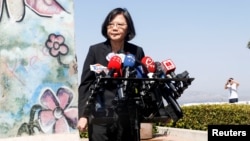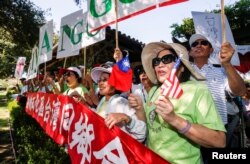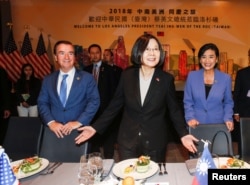This week Taiwan's president is in Los Angeles, marking the first time in 15 years that a Taiwanese leader is speaking publicly in the United States, in another sign of growing ties between Washington and Taipei.
President Tsai Ing-Wen met with U.S. lawmakers and Taiwanese Americans on Monday and Tuesday, drawing an official protest from China, which regards Taiwan as a breakaway province.
The division between Beijing and Washington over Taiwan sharpened this year when the U.S. Congress unanimously passed the Taiwan Travel Act, which allows U.S. officials at all levels to travel to Taiwan and for high-ranking Taiwanese officials to visit the United States.
Tsai Ing-Wen’s trip to the U.S. this week is the first since the Act was signed into law by President Donald Trump, and there is support for greater engagement.
Rep. Brad Sherman, Ranking Member of House Foreign Affairs Subcommittee on Asia and the Pacific, told VOA that he looks forward to welcoming Tsai in Washington in the future.
“There may be a time when the president of Taiwan addresses to the joint session of congress but I think that will be a willing in the next decade,” Sherman, who called himself a “strong advocate for U.S.-Taiwan alliance,” said. “It will begin not with the presidential visit but perhaps at the foreign ministerial level.”
China routinely objects to U.S. support for Taiwan and meetings with its leaders, but many U.S. lawmakers champion support for the democracy as a key American foreign policy priority. On Tuesday, China’s Taiwan Affairs office reiterated its opposition to any attempt to promote Taiwan’s independence.
“Taiwan is an inalienable part of China. We firmly oppose any attempt to create ‘two Chinas,’ ‘one China, one Taiwan’ and ‘Taiwan independence’ in the international arena,” it said in a statement responding to a question from AFP.
Championing democracy
During a brief speech at the Ronald Reagan Presidential Library during her two-day stopover in Los Angeles, Tsai vowed to defend the values of freedom and democracy.
“Everything was negotiable except two things: our freedom and our future,” Tsai quoted from former U.S. President Reagan’s remarks in her talk, adding that this is also how Taiwanese people feel at the moment.
“We will keep our pledge that we are willing to jointly promote regional stability and peace under the principles of national interests, freedom and democracy,” she said.
Although there are no official diplomatic ties between the governments of the U.S. and Taiwan, the U.S. sees the island as a strategic partner in the region, and Washington has long been Taipei’s strongest informal ally and chief arms supplier.
“I’m excited to welcome President Tsai to the U.S. It’s a great opportunity to continue to strengthen the relationship between the U.S. and Taiwan,” Senator Cory Gardner, Chairman of Senate Foreign Relations Subcommittee on Asia and the Pacific, told media before his meeting with Tsai.
Besides Senator Gardner, three U.S. Congress members from California also met with Tsai during her short visit to Los Angeles, including Ed Royce, Brad Sherman and Judy Chu.
However, the Trump administration on Tuesday rejected speculation there was any change in policy toward Taiwan.
"Our policy on Taiwan has not changed," State Department Spokeswoman Heather Nauert told reporters.
She said of Tsai's stop that the United States allows "from time to time representatives of the Taiwan authorities to transit the United States. Those are largely undertaken out of consideration for the safety and the comfort of those travelers, and that is in keeping with our One-China policy."
‘Bullying tactics'
Recently China has stepped up a pressure campaign against Taiwan as it tries to assert Chinese sovereignty.
Beijing has ordered foreign companies, including U.S. airlines companies, to label Taiwan as a part of China on their websites and is excluding Taiwan from many international forums.
“I think the U.S. needs to be extremely tough when it comes to China’s bullying tactics,”Senator Gardner said, "I think it's unacceptable for U.S. companies to be bullied by China and I have encouraged along with my colleagues, both Republicans and Democrats to stand up against China’s bullying behavior and tactics that try to intimidate U.S. companies over the way they recognize Taiwan.”
Rep. Ed Royce, Chairman of House Foreign Affairs Committee, told VOA that the focus of his work has been to develop policy to deepen U.S.-Taiwan economic relations.
“What we have tried to do is to have policies that will strengthen Taiwan Travel Act, and at the same time keep up the security in peace in strength,” Royce, who announced his retirement next January, said. “Most of my focuses have been what we can do to keep Taiwan economically strong. So we are working on a lot of trade initiatives, more investments, investments between the US and Taiwan. We think that is the right focus in terms of long term security.”
Tsai arrived in Los Angeles on Sunday for a transit stop on the way to a state visit to Paraguay and Belize, two of 18 nations that still have official diplomatic ties with Taiwan. She is expected to make another U.S. stopover in Houston on her way back on Aug. 18.









